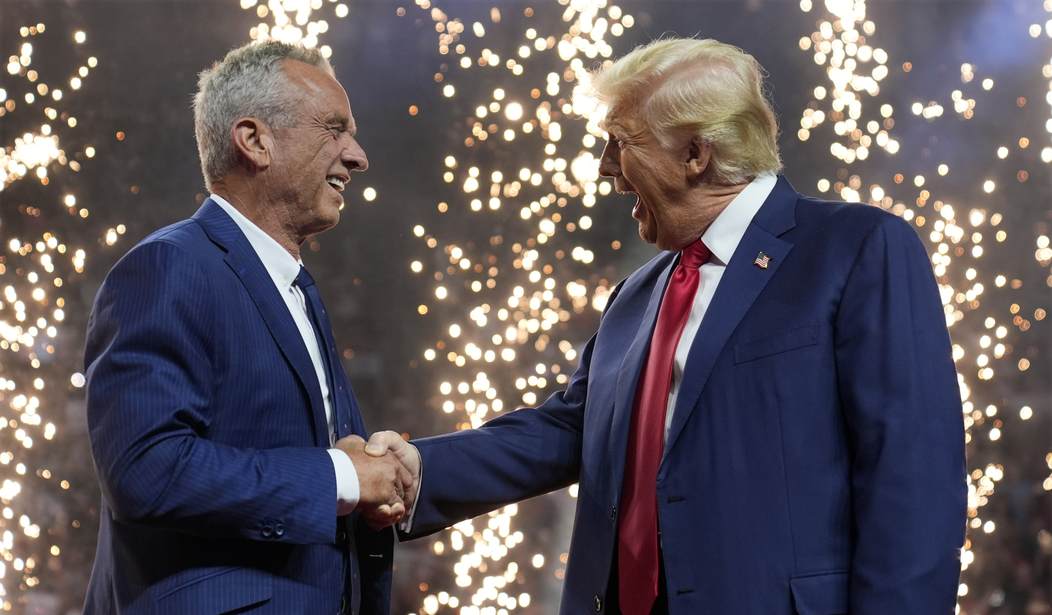A month ago, famed pollster Frank Luntz suggested that Robert F. Kennedy Jr.'s endorsement of Donald Trump in the 2024 election could be a game-changer in the election. Luntz argued that while Kennedy's influence had diminished since President Joe Biden dropped out of the race, his backing still carries enough clout to potentially swing the election in Trump's favor. Was he right?
“It’s probably worth about 1% for Trump, and that 1% could be everything if it’s in all the swing states,” Luntz said at the time. “In the end, the reason why Kennedy was strong—10%, 12%, even as high as 14%—is because he was taking votes away from Joe Biden. Joe Biden is gone. Kamala Harris has replaced him, and his vote collapsed down to about 4% or 5%. And what’s left is a Trump vote.”
Luntz wasn’t the only person to make a prediction like this. Conventional wisdom accepted that Kennedy’s departure from the race and his backing of Trump would hurt Kamala Harris to a small yet consequential degree. However, according to analysis from RealClearPolitics, "this added support [for Trump] has not materialized, as Harris still leads in the multiway race."
After Kennedy's endorsement, a Trump campaign memo revealed that its polling indicated that 53% of Kennedy's supporters would back Trump, while 29% would vote for Harris, giving Trump a net gain of 24% from Kennedy's 4-5% of voters.
Trump pollster Tony Fabrizio argues that RFK Jr.’s departure from the race + endorsement “is good news” for Trump.
— Shelby Talcott (@ShelbyTalcott) August 23, 2024
“In every single state RFK Jr’s vote breaks for President Trump,” he writes in a new memo: pic.twitter.com/2hfMfXgdwK
Despite this projection, Trump has gained only about 1%, and his position in the multiway race remains largely unchanged from before the endorsement.
"In the National Multi-Candidate RealClearPolitics Polling Average when Kennedy dropped out, Harris led by two points, 46.7% to 44.7%, with Kennedy at 4.8%, Green Party candidate Jill Stein at 0.8%, and independent Cornel West at 0.6%,” writes Jonathan Draeger at RealClearPolitics. "Since then, Harris’ lead has not dropped in the multiway RCP Average; instead, it actually increased to 2.4 points. The endorsement hasn’t helped in the head-to-head race either. Since Aug. 23, Harris’ lead has expanded from 1.6 points to 2.3 points in the Heads-Up RCP Average."
Draeger suggests that the failure of the Kennedy endorsement to move the needle as expected may be due to rising support for Libertarian candidate Chase Oliver. Before Kennedy dropped out, Oliver had less than 1% of independent voters and little general support. Kennedy, in contrast, had 10% support from independents and 3% from both Democrats and Republicans. However, recent polling shows Oliver now gaining 3% of the independent vote and between 0.5% and 1% from Democrats and Republicans, giving him 2% overall.
This shift is reflected in the RealClearPolitics (RCP) Average. Oliver now holds 1.1% alongside the other third-party candidates, Jill Stein and Cornel West, who have marginally increased their support to 1.1% and 0.9%, respectively. Though their numbers are small, these third-party candidates could still influence the outcome in a close race.
For sure, Kennedy’s endorsement slightly boosted Trump, as his polling rose from 44.7% to 45.8% over the past month. However, Harris’ support has, according to national polls, steadily climbed since she entered the race, rising from 42.5% to 47.9%, counteracting the effect of Kennedy’s endorsement on Trump.
Another key factor could be that independent voters were already leaning toward Trump. Just last week, a Gallup survey showed Harris with a disastrous net favorability rating of -25 points, with 60% of independents viewing her unfavorably and only 35% favorably. While Trump also has a negative rating with independents, at -9 points, Trump has a substantial advantage on the issues that are most important for the voters.










